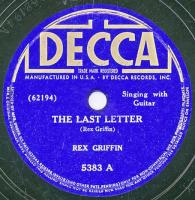"The Last Letter" is a song written by country music singer Rex Griffin. Griffin wrote the song in 1937, after he was left by his wife. The song tells through a suicidal letter the feelings of an older man who is left by his young wife. The song, released on Decca Records became a hit for Griffin.
| "The Last Letter" | |
|---|---|
 | |
| Single by Rex Griffin | |
| B-side | "Over the River" |
| Published | December 27, 1939 M. M. Cole Publishing Co.[1] |
| Released | June 1937 |
| Recorded | May 13, 1937[2] |
| Studio | New York |
| Genre | Hillbilly |
| Length | 3:03 |
| Label | Decca 5383 |
| Songwriter(s) | Rex Griffin |
A standard of country music, the tune was covered by diverse acts. Jimmie Davis' 1939 version became a hit, while it was covered by diverse country acts.
Writing and original recording
editIn 1937, singer-songwriter Rex Griffin wrote "The Last Letter" while he was living in New Orleans, Louisiana.[3] He was inspired to write the song after he was left by his wife.[4] The lyrics told the story of a suicide letter[5] written by a common man directed to a woman seeking a rich husband and the finer things in life. It described his bitterness, and pain for the end of their romance.[4] The song probably inspired Hank Williams's similar "A Mansion on the Hill."
Griffin recorded "The Last Letter" during a New York session on May 13, 1937.[3] The single, backed with "Over the River" on the flipside was released the same year on Decca Records. Despite that "The Last Letter" turned into a hit, the poor sales of Griffin caused his dismissal by the label in 1939.[6] That year, Griffin wrote and recorded a sequel called "Answer To The Last Letter". The song became later considered a standard of Country music.[7] By 1941, The Birmingham News reported it to be "one of the most popular boots and saddle songs played by drugstore cowboys".[8]
Cover versions
editCountry singer Jimmie Davis recorded the song again in 1939, turning it again into a hit.[4] It was covered as well by The Blue Sky Boys and The Carter Family.[9]
In 1963, Ernest Tubb recorded a cover version for his Rex Griffin tribute album Just Call Me Lonesome. The song was recorded at Bradley's Barn studio on April 19, 1962, produced by Owen Bradley[10] Tubb, who was influenced by Griffin, had originally learned the song and others by Griffin that he would often perform. Both singers toured together, remaining friend until Griffin's death in 1958.[11] The same year, Willie Nelson recorded the song. Capitol Records released the song as the flipside of the single "Half a Man".[12]
The following year, Jack Greene released his version of the song on the album Ernest Tubb Presents the Texas Troubadours, becoming after its success a solo act.[13] "The Last Letter" was also covered by Waylon Jennings, Merle Haggard and Glen Campbell.[6]
Bob Dylan's To Ramona is a nod to Rex Griffin and his song The Last Letter.
Footnotes
edit- ^ Library of Congress. Copyright Office. (1940). Catalog of Copyright Entries 1940 Musical Compositions New Series Vol 35 Pt 3 For the Year 1940. United States Copyright Office. U.S. Govt. Print. Off.
- ^ "Decca matrix 62194. The last letter / Rex Griffin - Discography of American Historical Recordings". adp.library.ucsb.edu. Retrieved 2021-10-19.
- ^ a b Pugh, Ronnie 1988, p. 74.
- ^ a b c Wolff, Kurt 2000, p. 118.
- ^ Tosches, Nick 2009, p. 63.
- ^ a b Erlewine, Stephen Thomas, Bogdanov, Vladimir & Woodstra Chris 2003, p. 297.
- ^ Sachs, Bill 1958, p. 6.
- ^ House, Jack 1941, p. 11.
- ^ Larkin, Collin 1998, p. 177.
- ^ Pugh, Ronnie 1998, p. 275, 404–405.
- ^ Pugh, Ronnie 1998, p. 74–75.
- ^ Billboard staff 1963, p. 24.
- ^ Pugh, Ronnie 1998, p. 275.
References
edit- Billboard staff (1963). "Singles Review". Billboard. Vol. 75, no. 3. Nielsen Business Media, Inc. ISSN 0006-2510.
- Erlewine, Stephen Thomas; Bogdanov, Vladimir; Woodstra Chris (2003). All Music Guide to Country: The Definitive Guide to Country Music. ISBN 978-0-87930-760-8.
- Escott, Colin; Merritt, George; MacEwen, William (1994). Hank Williams: The Biography. Hachette Digital, Inc. p. 307. ISBN 0-316-24986-6.
- House, Jack (June 29, 1941). "The Last Letter". The Birmingham News. Vol. 29, no. 42. Birmingham, AL. Retrieved December 16, 2021 – via Newspapers.com.
- Larkin, Collin (1998). The Virgin Encyclopedia of Country Music. Indiana University. ISBN 978-0-7535-0236-5.
- Pugh, Ronnie (1988). "Rex Griffin: Passing on the Rodgers Legacy". Mid-America Folklore. 16–17. Ozark States Folklore Society and the English Department, Southwest Missouri State University.
- Pugh, Ronnie (1998). Ernest Tubb: The Texas Troubadour. Duke University Press. ISBN 978-0-8223-2190-3.
- Sachs, Bill (1958). "Folk Talent & Tunes". Billboard. Vol. 70, no. 48. Nielsen Business Media, Inc. ISSN 0006-2510.
- Tosches, Nick (2009). Country: The Twisted Roots of Rock 'n' Roll. Da Capo Press. ISBN 978-0-7867-5098-6.
- Wolff, Kurt (2000). Country Music: The Rough Guide. Rough Guides. ISBN 978-1-85828-534-4.